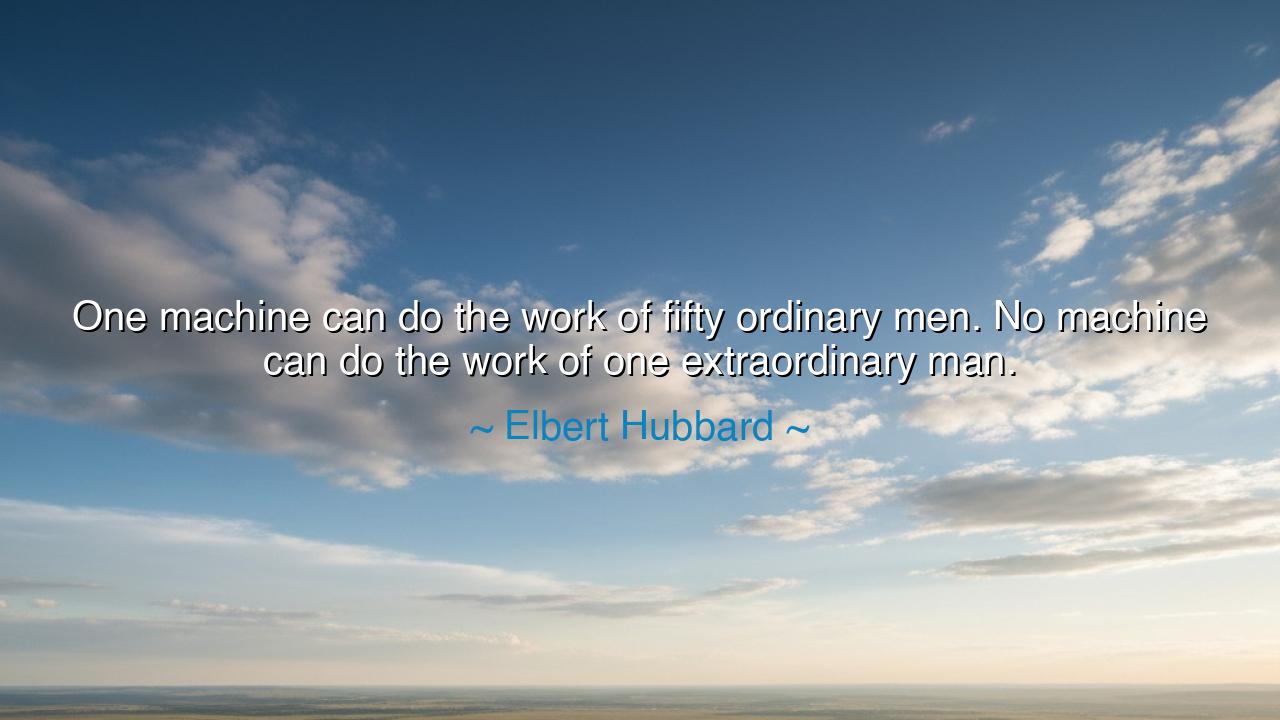
One machine can do the work of fifty ordinary men. No machine can
One machine can do the work of fifty ordinary men. No machine can do the work of one extraordinary man.






In the tapestry of human history, there have always been those who sought to shape the world not through the power of their hands alone, but through the power of their vision, their will, and their extraordinary minds. Elbert Hubbard, a man of both insight and invention, once declared: "One machine can do the work of fifty ordinary men. No machine can do the work of one extraordinary man." These words resonate deeply with the ancient wisdom passed down through the ages, that while machines—be they the humble tools of labor or the complex engines of modern industry—can enhance and multiply human effort, they can never replace the unique brilliance of the human spirit.
Consider, O seekers of wisdom, the great philosophers and visionaries who, through their insight, changed the course of history. Socrates, for example, did not wield a sword or build an empire, yet his ability to challenge the minds of men and shape their thinking has left a legacy that still shapes our philosophy today. It was not his physical labor that defined his greatness, but the power of his mind and his willingness to question the status quo. The same is true of Plato, whose ideas created the foundation for much of Western thought. No machine, however advanced, could replace the profound impact of these extraordinary men, whose vision and intellect shaped the world.
In the realm of history, we find numerous examples where individuals, driven by extraordinary vision or character, changed the course of nations and peoples. Take, for instance, the story of Leonardo da Vinci, whose genius transcended the boundaries of art, science, and engineering. While the world was rife with skilled artisans and builders, it was da Vinci’s ability to see beyond the world as it was and envision it as it could be that made him a towering figure. His sketches of flying machines, even centuries before the invention of flight, demonstrated that no machine could ever replace the creative spark that burned in the heart of one extraordinary man. In this way, Hubbard’s words ring true—machines can only replicate the tasks they are designed for, but it is the extraordinary man who shapes the future.
Think also of Alexander the Great, whose conquests created an empire that stretched from Greece to India. His military genius, his ability to inspire and lead, transformed the face of the ancient world. Though armies—comprised of countless men and machines of war—followed him, it was his extraordinary leadership, his vision, and his charisma that drove those men to victory. It was not the power of the sword alone that made him great, but his ability to command, to think, and to inspire those around him. No machine, no matter how well-armed, could have conquered the vast territories that Alexander did. It was the extraordinary man who shaped the empire, not the tools he used.
Yet, Hubbard’s words also remind us that the extraordinary man or woman does not rise by chance. To achieve greatness requires more than just brilliance—it requires dedication, courage, and the ability to overcome challenges that might seem insurmountable. For while machines may do the work of many ordinary men, the extraordinary man is shaped through struggle, through learning, and through the willingness to stand apart from the crowd. It is not genius alone that makes one extraordinary, but the heart and the mind to apply that genius for a greater purpose.
In your own life, O children of the Earth, let this wisdom serve as a guide: machines can multiply the efforts of the ordinary, but it is the extraordinary spirit within each of you that can move mountains. Just as Socrates challenged the minds of his followers, or da Vinci dreamed of flying long before humanity took to the skies, so too can you shape your world. Embrace your own uniqueness, and understand that your vision, your passion, and your courage are the true forces that will define your path. The machine may assist you, but it is your extraordinary qualities that will carry you to greatness.
So, let Hubbard’s wisdom resonate within you: never underestimate the power of the human spirit. While tools may increase our capacity, it is the extraordinary man—or woman—whose vision, ideas, and actions shape the world. Seek not to rely solely on the machinery of your time, but to cultivate the extraordinary within yourself. For in the end, it is not the work of the machine that defines history, but the work of the extraordinary souls who dare to think, create, and lead. May you, too, rise to the call of greatness, knowing that the tools you wield are but extensions of the extraordinary power that lies within.






AAdministratorAdministrator
Welcome, honored guests. Please leave a comment, we will respond soon